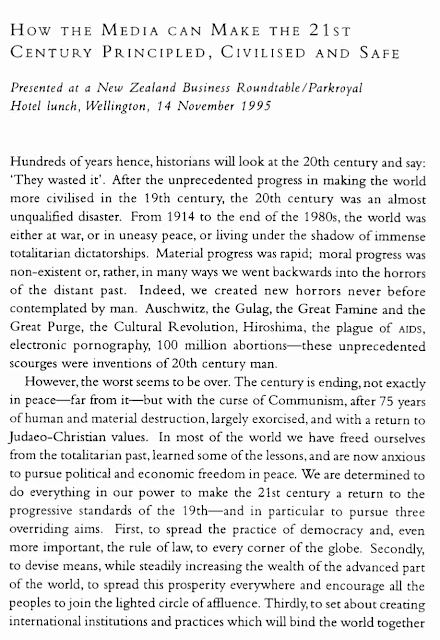 |
| Source: Daily Telegraph |
I'm disappointed this morning to hear that historian Paul Johnson has died -- aged 94, it seems!
I haven't read him for a while, but I did, many years ago. In some ways he provided my introduction to a lot of 19th and 20th century history through his two books Birth of the Modern, and Modern Times, which is still a masterful account of the post-colonial independence movements around the post-WWII-world. I still reflect occasionally on his comment in the latter that New Zealand represents a lonely beacon with a unique respect for individual human lives.
He wrote well, and broadly -- both things rare these days in a historian. Those two books above remain my two favourites of his.
Others I rate would be his A History of the American People (he rates the creation of the United States, with only slight hyperbole, as "the greatest of all human adventures" -- "no other national story holds so many tremendous lessons," he says) -- and Intellectuals: From Marx and Tolstoy to Sartre & Chomsky, in which he "revels in the wickedness" of so many who have shaped history for the worst. None emerge well. It's less an attack on their ideas than on the distance between their ideas and their private lives. Of Marx, for example, he reveals that he never went near a factory in his life, that many of the most lubricious 'facts' related in Das Kapital were from long-out-of-date government reports scarcely reflective of contemporary working conditions, and that maybe the only exploited labourer he every knew personally was his maid -- whom he impregnated, forcing the child into an orphanage, and never paid her a cent for her work.
He visited New Zealand in 1995, at the invitation of the Business Roundtable, and you can still read the talks he delivered here. One topic seems especially relevant today...
As an author, he was prolific. He was reputed to write in a small study in his house, a "writing machine" lined with book shelves all within arm's reach, which he pre-loaded with pre-prepared file cards (see pic above) and all the books necessary for his forthcoming tome. I've tried that too. It takes a lot of books!
"His stream of books was almost torrential," writes Theodore Dalrymple in his obituary of the man. "Perhaps his biggest and most influential one was Modern Times: The World from the Twenties to the Eighties(1983).""What Johnson called 'gangster despots' came to dominate the history of the first half of the twentieth century, and he was scarcely more flattering about the self-proclaimed liberators of the second half. Even those who did not altogether approve of, or share, his historical outlook admitted that this book was a tour de force. 'Modern Times' influenced a generation of American conservatives....
"Johnson liked nothing more than to infuriate by means of iconoclastic polemic. His book 'Intellectuals' (1988) provided potted biographies of such revered figures as Rousseau, Marx, and Tolstoy, demonstrating what rotters they all were in their personal lives. This was not exactly an exercise in scientific method, but it was good fun and gave pleasure to those who distrust intellectual gurus. It also gave rise to insinuations that Johnson himself did not always quite live up to the moral ideals that he so fiercely propounded in public.
"He coined striking phrases—Hitler’s views, for example, were 'the syphilis of antisemitism in its tertiary phase'—and he could never be accused of mealy-mouthedness. His views, though somewhat changeable, were expressed with vigour approaching dogmatism, though they were always well-informed. You knew where you stood with him.
"It is customary to say of remarkable men that we shall not see their like again. Whatever may be the case with other remarkable men, this is likely to be true of Paul Johnson. It is unlikely that anyone will tackle so huge a range of subjects again with such knowledge and verve."
Johnson is somewhat of a litmus test for contemporary times. Without changing his own views substantially -- he was, and remained, an individualist -- he was first seen as a proud and leading member of Britain's intellectual left (he as editor for a time of the New Statesman) and then as a Thatcherite; in the US he was enthusiastically embraced by a generation of conservatives (as Dalrymple relates above), then dropped for being too "challenging."
For one thing, his conservatism was unmistakably 'Thatcherite' and had free market undertones, which are less popular now than they used to be. For another, Johnson was a polemicist but his books (and his understanding of history) are rich with nuances. And that doesn’t go very well with the Zeitgeist, left or right.This says more, of course, about the changing periods through which he lived and wrote, than it does about Johnson himself. A fact the great historian would no doubt have found fascinating.

1 comment:
Bugger. Yes I have a couple of his books, he was brilliant.
Post a Comment